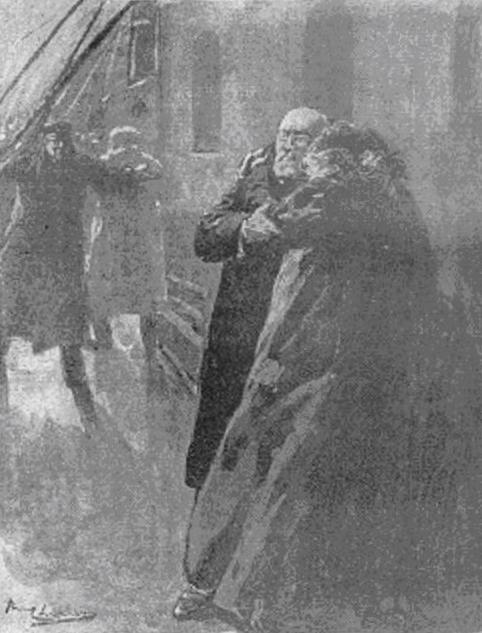Isidor Straus was a Jewish businessman and politician who The Philadelphia Inquirer described as “a close personal and political friend of President Cleveland.” As a matter of fact, he was one of three very prominent brothers.
One brother, Oscar, was the first Jewish United States Cabinet Secretary, serving as President Theodore Roosevelt’s Secretary of Commerce and Labor. The third brother, Nathan, had been a passionate Zionist who helped found the Israeli city of Netanya, which was named after him. They also had a sister, Hermine Kohns, and a brother who sadly passed away as a toddler.

Each of the Strauses can easily be discussed at length, but we will focus on Isidor in particular. Born in 1845 in Bavaria, Isidor and his family came to the United States when he was nine, and they lived in Georgia. Though he was originally aligned with the Confederates, he moved to New York City after the Civil War.
Straus served one term in Congress from 1894 to 1895, after winning a special election. One particular bill that he was a staunch advocate for was the Wilson Tariff Act. The New York Times reported on a conversation with Straus, who said “the results that will flow from it will be so great and so widely distributed that the country and the party would be greatly benefited.” Straus was asked, “are you satisfied with the Wilson bill?” “Not at all,” he responded, but “it is the best we can do at present.” The bill eventually passed.
Straus also found himself “tired,” according to an 1894 Washington Post editorial. Lots of New Yorkers hoping to get elected to office annoyed him because they were confronting congresspeople to ask for endorsements. So, Straus introduced a bill which would require aspiring politicians to deliver such a request only in writing.
Straus did not run for reelection. In 1896, he and his brother Nathan became co-owners of Macy’s. Cleveland had offered Straus the position of Postmaster General, but he declined. Kurt F. Stone describes in his book The Jews of Capitol Hill how Straus was encouraged to run for mayor too, yet never sought political office again.
Instead, Straus championed charitable causes and helped found The Educational Alliance and Montefiore Hospital, according to Rivka Ronda Robinson in an article for Aish. The Straus family remained politically active even beyond Isidor as well.

The New York Times reported how in 1912 Isidor and his wife, Ida, had traveled to France for the winter, and that Straus was also interested in learning more about the currency system in Europe to hopefully bring home information “that will help us in new legislation for reforming our currency.”
Straus stated in a letter that they were returning to New York soon: “We sail for home,” he wrote, “on the steamer ‘Titanic,’ leaving from Southampton April 10th.” (The original letter sold at RR Auction in 2013 for over $46,000.)
According to Senate testimony following the doomed voyage, Ida was about to go into a lifeboat, when she returned to her husband and said something reminiscent of Ruth: “We have been living together for many years, and where you go I go.” They even tried to allow Isidor onto the boat as well, but he refused: “I will not go before the other men.” So they both remained on the sinking ship.
C.H. Stengle, telling his story in the short-lived Chicago newspaper The Day Book, said that Isidor and Ida Straus “were Darby and Joan in life.” (“Darby and Joan” is a term for an old, devoted, and happy couple.)

While the 1997 blockbuster movie “Titanic” showed Isidor and Ida holding each other in bed as their room began to flood, it is quite evident that this is not an accurate depiction of their last moments.
“As our boat drew away, we could see them standing there together, Straus with his arms about his wife,” Stengle recalled. According to the UK National Archives, “Isidor and Ida were last seen together on deck holding hands before a wave swept them both into the sea.”
Straus Park in Manhattan’s Upper West Side is named for Isidor and Ida, and on the monument is inscribed a part of II Samuel 1:23: “Lovely and pleasant were they in their lives and in their death they were not divided.”
Isidor and Ida Straus’s great-great granddaughter, Wendy, married Stockton Rush, the head of OceanGate, who along with four others tragically died in the recent headline-making submersible implosion which happened while on their way to see the wreckage of the Titanic.
Paul Kurzman is a great grandson of Isidor and Ida Straus. He told the Atlanta Jewish Times that Isidor’s body was recovered, and in his vest they found a locket with two small photographs inside, one being Kurzman’s grandmother. This locket ended up getting passed down to Kurzman, who called it “my greatest treasure. I can’t even put into words what it means to me.”
Isidor Straus’s story is a remarkable one. Born to a Jewish family in Bavaria, and arriving at a young age to Georgia just in time for the Civil War, he was a successful businessman who served in Congress, became close friends with a US president, played a key role in charitable causes and organizations, and faced a tragic demise in the notorious Titanic disaster. His unique story is one worth remembering.